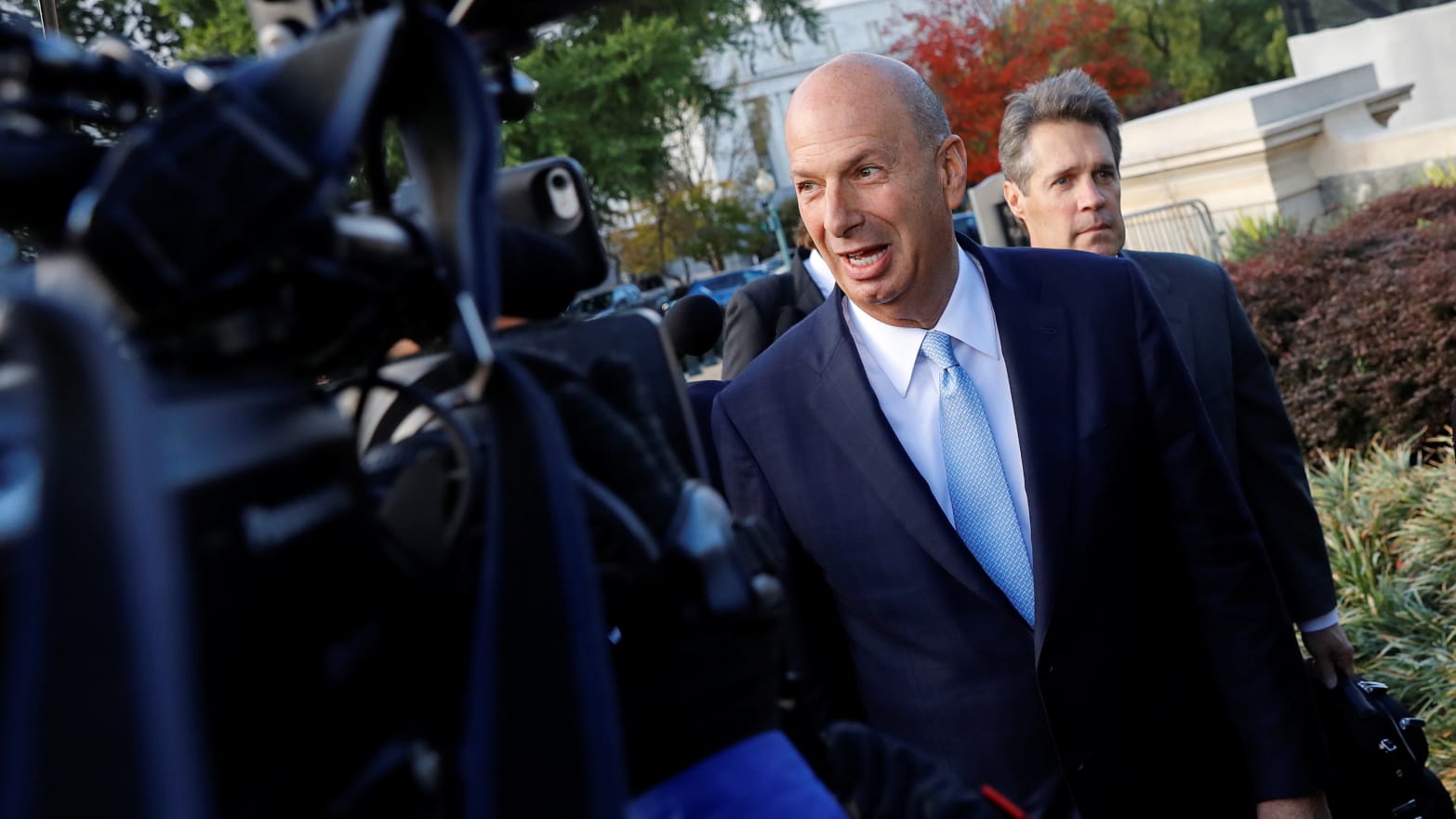Gordon Sondland, the U.S. ambassador to the European Union, will tell Congress that President Donald Trump told him to help his personal attorney Rudy Giuliani with his plan on Ukraine.
In his opening statement, which was obtained by The Daily Beast, Sondland wrote that any plot to encourage a foreign government to influence an American election would have been “wrong.”
“I did not understand, until much later, that Mr. Giuliani’s agenda might have also included an effort to prompt the Ukrainians to investigate Vice President Biden or his son or to involve Ukrainians, directly or indirectly, in the President’s 2020 reelection campaign,” he will say, according to the written version of his opening statement.
Sondland's role in the pressure campaign on the Ukrainian president was first revealed by The Daily Beast. He and Giuliani encouraged President Volodymyr Zelensky to publicly announce an investigation into the Bidens. It has been alleged that there was a quid pro quo whereby Zelensky would be rewarded by the White House with a meeting between the presidents in return for launching an investigation into one of Trump's potential 2020 rivals.
“Please know that I would not have recommended that Mr. Giuliani or any private citizen be involved in these foreign policy matters. However, given the President’s explicit direction, as well as the importance we attached to arranging a White House meeting between Presidents Trump and Zelensky, we agreed to do as President Trump directed,” Sondland wrote.
“Based on the President’s direction, we were faced with a choice: We could abandon the goal of a White House meeting for President Zelensky, which we all believed was crucial to strengthening U.S.-Ukrainian ties and furthering long-held U.S. foreign policy goals in the region; or we could do as President Trump directed and talk to Mr. Giuliani to address the President’s concerns.”
The testimony describes how Trump's obsession with investigating his political rival put on hold Sondland's efforts to strengthen U.S. ties with Ukraine. Sondland will say he was “disappointed” that Trump wouldn't commit to a meeting with Zelensky until he spoke to Giuliani.
“It was apparent to all of us that the key to changing the President’s mind on Ukraine was Mr. Giuliani,” the statement reads. “It is my understanding that Energy Secretary Perry and Special Envoy Volker took the lead on reaching out to Mr. Giuliani, as the President had directed.”
According to the testimony, when he spoke to Giuliani it was made clear that Trump wanted a public statement from Zelensky “committing Ukraine to look into anticorruption issues.” Sondland will say: “Mr. Giuliani specifically mentioned the 2016 election (including the DNC server) and Burisma as two anticorruption investigatory topics of importance for the President.”
Burisma was the energy firm where, for five years, Hunter Biden served on the board. Trump has, with no evidence, repeatedly accused former Vice President Joe Biden of acting improperly to protect his son by urging the removal of Ukraine’s former general prosecutor, who was looking into money laundering allegations at the company at the time.
Aspects of Sondland’s opening statement raise questions about his candor. The former hotelier portrays Giuliani as the lever to moving Trump on Ukraine policy, something he describes in his statement as a priority of his ambassadorship. Yet he also claims not to “recall having met with Mr. Giuliani in person” and only communicating with him “a handful of times.”
Although Sondland describes an investigation of Burisma as important to Trump, as conveyed by Giuliani, Sondland claims not to have known about Hunter Biden’s place on the company’s board.
Similarly, Sondland presents his now-famous instruction, revealed in text messages provided by former special envoy to Ukraine Kurt Volker, to cease texting about a pressure campaign and to instead talk on the phone, as nothing more than a communications preference, rather than a belated reluctance to create a document of their conversation. “I simply prefer to talk rather than to text,” he says in his statement.
Sondland will testify that he was not on the Zelensky call and didn't see the transcript until September, when a truncated transcript was publicly released by the White House. Sondland will say that none of the summaries of the call he received before then mentioned Burisma or Biden, or suggested that Trump had made “any kind of request of President Zelensky.”
Sondland will say, “Let me state clearly: Inviting a foreign government to undertake investigations for the purpose of influencing an upcoming U.S. election would be wrong. Withholding foreign aid in order to pressure a foreign government to take such steps would be wrong.”
He'll add, “I did not and would not ever participate in such undertakings.”
—with additional reporting by Spencer Ackerman


